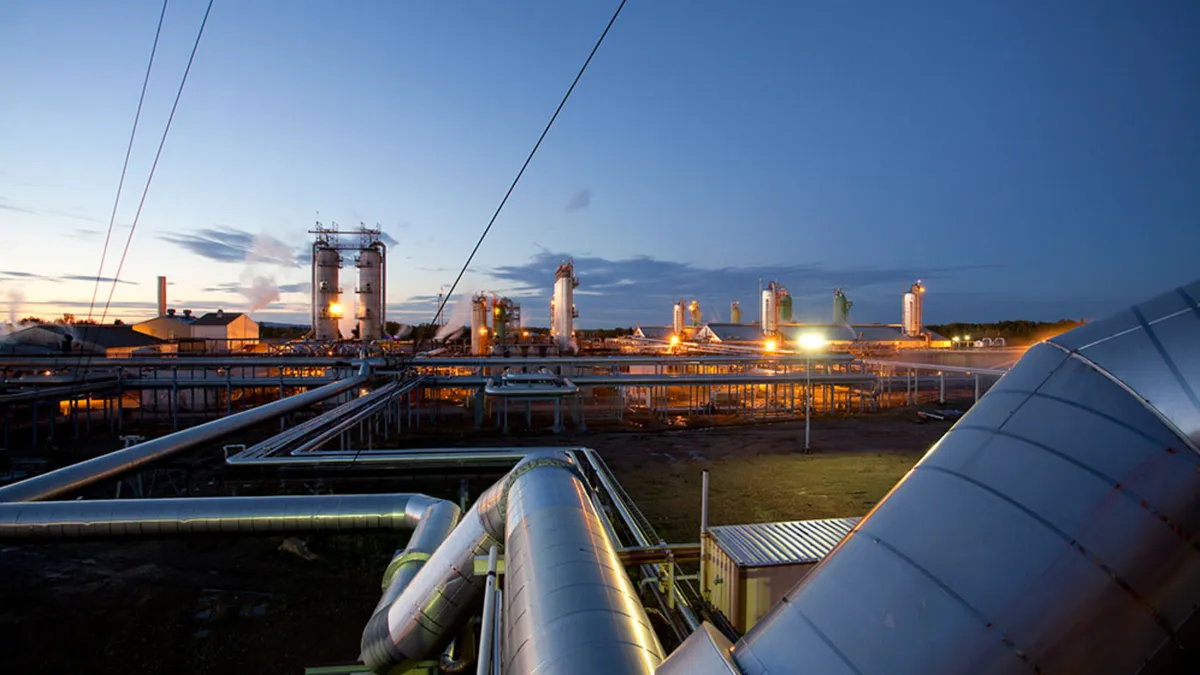Dive Brief:
- The North American Electric Reliability Corp. yesterday issued a set of recommendations aimed at the United States' growing dependence on natural gas, calling for new planning processes as intermittent generation rises and coal and nuclear plants retire.
- The report calls for more coordination between the electric and gas sectors, and says regulators need to consider fuel diversity as they evaluate the electric system and energy policy objectives.
- The report aimed to quantify potential impacts of a disruption along the natural gas supply chain. The Natural Gas Supply Association responded quickly, highlighting the fuel's reliability and noting that NERC's assessment looked at "severe" disruptions and that the fuel is a boon to system reliability.
Dive Insight:
NERC's report calls on regulators to take several steps, including the expedited approval of new gas and transmission projects to help diversify the system and make it more resilient to gas supply disruptions. As renewable energy grows and coal and nuclear plants retire, NERC's report suggests the power and gas industry must take steps to ensure "severe disruptions" do not snowball into larger issues.
“The operating realities of renewables and other intermittent generation resources, when combined with ongoing coal and nuclear retirements, create a greater dependence on natural-gas fired generation,” John Moura, director of Reliability Assessment and System Analysis, said in a statement. “In light of the power sector’s rising reliance on natural gas, the loss of gas facilities must be added to the list of potential extreme contingencies used to measure system reliability impacts.”
Fuel supply has become a hot topic in the industry, since the U.S. Department of Energy suggested market changes to reward coal and nuclear generation for the fuel they store onsite. NERC's report suggests that if those types of generation facilities retire, more emphasis will need to be placed on gas transmission to ensure grid stability.
The report suggested the DOE consider collecting data to quantify dual fuel storage and seasonal onsite inventory for natural gas, and said owners and operators of dual-fuel generators must ensure their operability.
Also, NERC concluded that during the planning process, system planners should work with regulators to incorporate "expeditious consideration" of air permit waivers, which the group said could be needed for resilience purposes, as well as dual fuel, back-up pipeline capacity, and/or alternative sources of supply.
Thomas Coleman, NERC director of reliability assessments, said that comprehensive planning "can significantly increase the grid’s resilience."
The report does note the natural gas industry has demonstrated "a high degree of reliability," but it also says recent events like the natural gas leak at Aliso Canyon, in California, "raised awareness of the [bulk power system's] dependency on natural gas infrastructure and calls for a closer look at the facilities that support fuel deliveries to electric generation."
In 2015, a leak at the facility was discovered, forcing the evacuation of nearly 6,000 residents and leading to emergency orders to help maintain power reliability in the region. This year, state regulators said the facility could reopen at roughly a third of its original size.
However, a study completed at the request of Los Angeles County this year also concluded the Southern California Gas storage facility is not needed to maintain electric reliability — and that state regulators have issued confusing and incomplete guidance on the issue.
Dena Wiggins, president and CEO of NGSA, said in a statement that the gas industry remains highly reliable, touting its physical-fuel characteristics and wide markets.
“While disaster scenario-planning can be useful, it’s important to keep in mind that NERC did not attempt to determine the likelihood of any of these hypothetical disruptive events ever actually occurring," Wiggins said. "The diverse nature of natural gas supply sources reduces the likelihood of natural gas infrastructure outages affecting electric generation."
And Wiggins said that in the event of there is a disruption, NERC's report also pointed out "there are many mitigation strategies that can be successfully employed to reduce the potential impacts of a natural gas disruption."
A copy of the NERC report can be found here.















